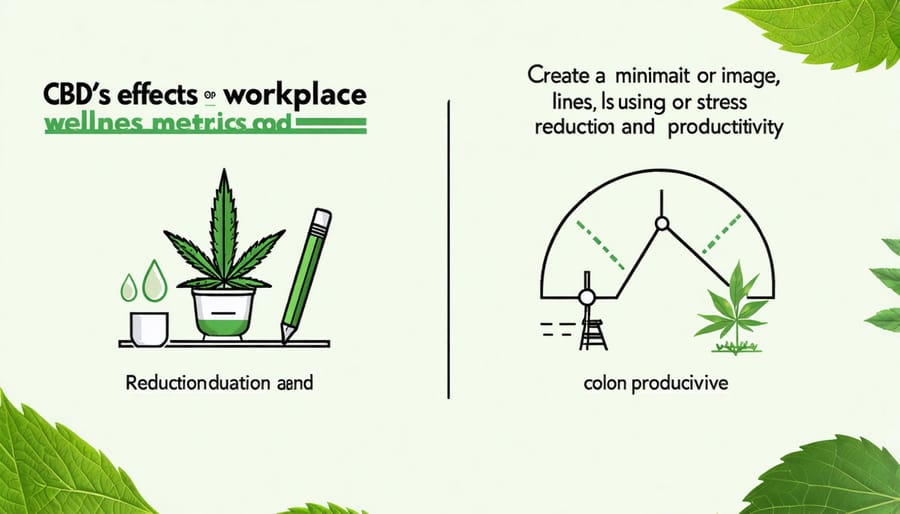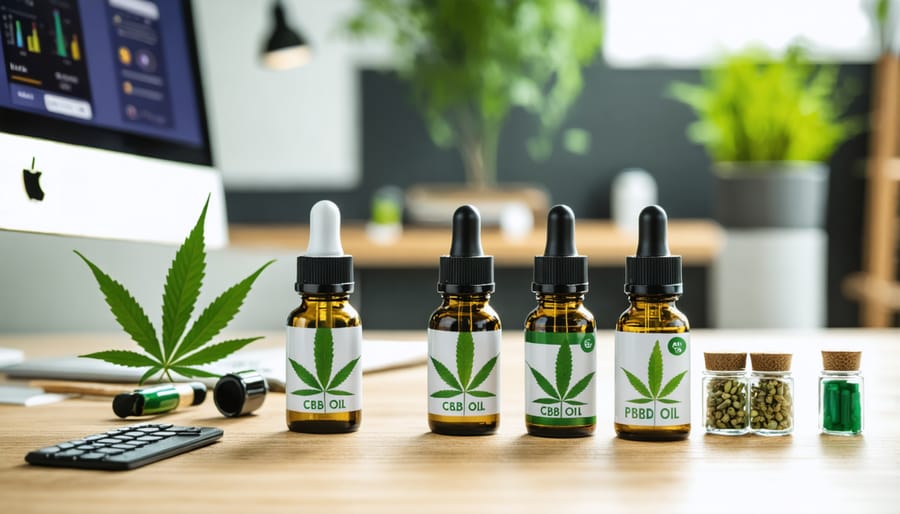In today’s evolving workplace landscape, CBD oil emerges as a groundbreaking addition to corporate wellness programs. Forward-thinking HR leaders at North Wellness and other progressive organizations are discovering how this natural compound can transform employee well-being initiatives. As mental health and stress management take center stage in workplace discussions, CBD-based solutions offer a science-backed approach to enhancing employee wellness programs, reducing anxiety-related absences, and fostering a more resilient workforce.
The integration of CBD oil into HR strategies represents more than just a wellness trend—it’s a strategic response to the growing demands of modern workplace stress management. With 83% of U.S. workers reporting workplace stress and companies losing an estimated $300 billion annually to stress-related absenteeism, innovative solutions are crucial. This comprehensive approach to employee wellness not only addresses immediate health concerns but also positions organizations at the forefront of progressive workplace policies, attracting top talent and fostering a culture of holistic well-being.
The Science Behind CBD in Workplace Wellness
Understanding CBD’s Impact on Employee Performance
Research shows that CBD interacts with the body’s endocannabinoid system, which plays a crucial role in regulating stress, mood, and cognitive function. For employees, this interaction can translate into several workplace performance benefits.
CBD has demonstrated potential in reducing work-related anxiety by modulating serotonin receptors, helping employees maintain composure during high-pressure situations. Studies indicate that appropriate CBD use may improve focus and concentration by reducing mental clutter and promoting a state of calm alertness.
In terms of stress management, CBD works by lowering cortisol levels – the body’s primary stress hormone. This can help employees handle workplace challenges more effectively and maintain emotional equilibrium throughout the workday.
Notably, CBD doesn’t produce psychoactive effects like THC, meaning employees can experience these benefits without impairment. Many professionals report enhanced productivity through better sleep quality and reduced physical tension, common benefits associated with CBD use.
However, it’s essential to note that individual responses vary, and effects are typically subtle rather than dramatic. The key lies in finding appropriate dosages and implementing CBD as part of a comprehensive wellness strategy.

Separating Fact from Fiction: CBD Misconceptions
As HR professionals explore CBD wellness initiatives, it’s crucial to separate fact from common misconceptions. Many people incorrectly assume CBD causes intoxication or impairment, but pure CBD products contain minimal to no THC, the psychoactive compound in cannabis. Research has shown that quality CBD products don’t impact cognitive function or work performance.
Another prevalent myth is that CBD will result in failed drug tests. While this concern is understandable, standard workplace drug screens typically test for THC, not CBD. However, it’s essential to source CBD products from reputable manufacturers who provide third-party lab results confirming THC content.
Some worry that introducing CBD programs might promote drug use, but this overlooks CBD’s legitimate therapeutic applications. Many Fortune 500 companies have successfully implemented CBD wellness programs, reporting improved employee stress management and reduced workplace anxiety.
Legal concerns often surface, but CBD derived from hemp is federally legal in the United States. However, companies should still consult local regulations and legal counsel when developing CBD-inclusive wellness policies.

Legal Considerations for HR Professionals
Workplace Policy Development
Developing a comprehensive workplace policy for CBD use requires careful consideration of legal requirements, employee wellness needs, and organizational culture. Start by consulting with legal experts to ensure compliance with federal, state, and local regulations regarding CBD products in the workplace. Consider implementing clear guidelines that distinguish between CBD and THC-containing products.
Create specific protocols for employees who use CBD as part of their wellness routine. Include provisions for documentation of medical use, guidelines for usage during work hours, and clear communication channels for addressing concerns or questions. Establish boundaries regarding the storage and consumption of CBD products on company premises.
Consider incorporating the following elements in your CBD policy:
– Definition of permitted CBD products
– Documentation requirements for medical use
– Guidelines for usage during work hours
– Storage and handling protocols
– Testing and quality assurance standards
– Reporting procedures for adverse effects
– Educational resources for employees
Regular policy reviews and updates are essential as CBD regulations evolve. Maintain open communication with employees about policy changes and provide training to managers on proper implementation. Partner with wellness providers who understand CBD regulations and can offer guidance on integration with existing health programs.
Remember to emphasize that all CBD products used under company policy must be legally compliant and properly tested. Consider implementing a pilot program before full-scale adoption to assess effectiveness and address potential challenges.
Compliance and Risk Management
When integrating CBD oil into workplace wellness programs, organizations must navigate a complex landscape of legal and regulatory requirements. HR professionals should first consult with legal counsel to understand federal, state, and local regulations governing CBD use in the workplace. While many areas have legalized CBD products, compliance with CBD oil industry standards and workplace safety regulations remains crucial.
Develop clear policies addressing CBD use during work hours, testing procedures, and accommodation requests. These policies should align with existing drug-testing protocols and workplace safety guidelines while considering potential ADA implications for employees using CBD for medical purposes.
Risk management strategies should include:
– Thorough documentation of all CBD-related policies and procedures
– Regular policy reviews to ensure compliance with changing regulations
– Employee education programs about appropriate CBD use
– Clear communication channels for addressing concerns
– Vendor verification processes for CBD product sourcing
– Insurance coverage review and updates
Organizations should also maintain detailed records of any incidents or accommodations related to CBD use. This documentation helps protect against potential liability while demonstrating commitment to employee well-being and regulatory compliance. Regular audits of wellness programs ensure continued alignment with current regulations and industry best practices.
Implementing CBD in Corporate Wellness Programs

Employee Education and Communication
Successful implementation of CBD wellness programs requires a comprehensive education and communication strategy. Organizations should focus on creating transparent, informative channels that address employee concerns while highlighting potential benefits. This approach aligns with effective team management strategies and enhances overall workplace wellness initiatives.
Start by developing clear, accessible educational materials that explain CBD basics, workplace policies, and usage guidelines. Consider hosting lunch-and-learn sessions, webinars, or interactive workshops as part of your professional development initiatives. These sessions can help demystify CBD while addressing common misconceptions and concerns.
Create a dedicated communication channel for CBD-related questions and feedback. This could be through an internal portal, regular newsletters, or designated HR representatives. Consider implementing a peer support system where employees who have benefited from CBD programs can share their experiences voluntarily.
Remember to maintain confidentiality and respect individual choices regarding participation. Regular updates about program developments, success stories, and relevant research findings help maintain engagement and build trust. This open dialogue approach ensures that employees feel supported and informed throughout their wellness journey.
Program Monitoring and Assessment
To effectively measure the impact of CBD oil wellness initiatives, organizations should implement comprehensive monitoring and assessment strategies. Start by establishing clear baseline metrics, including employee stress levels, productivity indicators, and absence rates. Regular surveys and feedback sessions can capture qualitative data about program satisfaction and perceived benefits.
Key performance indicators (KPIs) should track both direct and indirect outcomes. Direct measurements include program participation rates, reduction in stress-related complaints, and changes in health insurance claims. Indirect metrics might encompass improvements in employee engagement scores, team collaboration ratings, and overall workplace satisfaction.
Consider implementing a balanced scorecard approach that evaluates:
– Physical wellness metrics
– Mental health indicators
– Productivity measurements
– Cost-benefit analysis
– Employee retention rates
Document success stories and challenges through case studies, ensuring proper data privacy protocols. Conduct quarterly reviews to assess program effectiveness and make necessary adjustments. Calculate ROI by comparing program costs against measurable benefits such as reduced absenteeism and increased productivity.
Regular reporting to stakeholders should include both quantitative results and qualitative feedback, maintaining transparency while protecting individual privacy. This data-driven approach helps justify program continuation and guides future wellness initiatives.
Case Studies: CBD Success Stories
Several forward-thinking companies have successfully integrated CBD wellness programs into their HR strategies, yielding impressive results in employee well-being and workplace satisfaction. Here are three notable examples that demonstrate the potential of CBD-based initiatives:
Tech Giant Innovation Labs implemented a voluntary CBD wellness program in 2019, offering employees access to high-quality CBD products and educational resources. Within the first year, they reported a 28% reduction in stress-related sick days and a 32% increase in employee satisfaction scores. Their program included optional CBD-infused beverages in break rooms and wellness workshops focused on natural stress management techniques.
Midwest Manufacturing Solutions took a different approach by incorporating CBD options into their existing wellness benefits package. Employees could use their wellness allowance for CBD products from approved vendors, alongside traditional wellness services. The company documented a 23% improvement in workplace ergonomic-related complaints and a 15% decrease in anxiety-related HR consultations over 18 months.
Global Consulting Partners launched a pilot program in their Denver office, providing CBD-based stress relief options in their meditation rooms and relaxation spaces. The initiative was so successful that they expanded it company-wide, resulting in improved focus during long consulting sessions and better stress management among their high-pressure teams. Employee retention rates increased by 18% in departments participating in the program.
Key success factors across these cases included:
– Clear communication about CBD benefits and usage guidelines
– Partnership with reputable CBD suppliers
– Regular feedback collection and program adjustment
– Optional participation with no pressure
– Integration with existing wellness initiatives
– Comprehensive employee education
These companies emphasize that success depends on thoughtful implementation, careful vendor selection, and maintaining open dialogue with employees. Their experiences show that when properly executed, CBD wellness programs can contribute significantly to employee well-being and organizational success.
As we’ve explored throughout this article, CBD oil represents a promising frontier in modern HR wellness strategies. The growing body of evidence supporting its potential benefits for stress reduction, anxiety management, and improved focus makes it an attractive option for forward-thinking organizations. While challenges remain regarding implementation and compliance, many companies are successfully navigating these waters to create more comprehensive employee wellness programs.
The future outlook for CBD in corporate wellness appears increasingly positive, with more organizations embracing evidence-based approaches to employee well-being. As regulatory frameworks continue to evolve and research expands, we can expect to see more refined applications of CBD in workplace wellness initiatives.
Success stories from early adopters demonstrate that when properly implemented, CBD-inclusive programs can contribute to reduced stress levels, improved employee satisfaction, and enhanced productivity. Moving forward, HR professionals should stay informed about legislative changes, maintain open dialogue with employees, and continue developing robust policies that balance innovation with compliance.
The key to success lies in thoughtful implementation, clear communication, and ongoing program evaluation to ensure alignment with both organizational goals and employee needs.